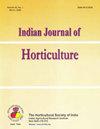Evaluation of cytogenetic effect of pesticides in onion root meristem
Q4 Agricultural and Biological Sciences
引用次数: 0
Abstract
Farmers use chemical insecticides, fungicides and herbicides to control insect pests, diseases and weeds. Extensive use of chemical pesticides is becoming hazardous to the environment and human and animal health. Biopesticides have been used as a safer alternative. Cytogenetic analysis is needed to determine the effects of chemical and biopesticides in plants if these are used frequently in an improper concentration. This investigation assessed the effects of a chemical systemic insecticide ‘Actara 25WG’ and a bioinsecticide ‘Bio Sona’ for seed germination and on root mitosis of five onion varieties. Three concentrations of Actara 25WG were used as seed treatment, viz., 25 g, 50g (recommended) and 75 g/kg seed. Similarly, Bio Sona was applied @ 2 %, 5 % (recommended) and 8 % concentrations. Depressing effects of the two pesticides were recorded in seed germination percentage except for Bio Sona 2% in variety Bhima Shakti. Actara 25WG and Bio Sona showed either mitoenhancing or cytotoxic effects depending on dose and variety. These pesticides also induced genotoxicity at recommended and higher doses on root tip cells as indicated by the frequency of total chromosomal aberrations like binucleate cells, clumps, stickiness, disturbed stage, laggards, bridges and fragments. Bio Sona at higher concentrations showed more aberrations than Actara 25WG. There were differential responses of the varieties to the pesticide treatment. More research must be done on the effects of chemicals and biopesticides in plants to assess their cytogenotoxicity.农药对洋葱根分生组织细胞遗传学效应的评价
农民使用化学杀虫剂、杀菌剂和除草剂来控制害虫、疾病和杂草。化学农药的广泛使用正在对环境以及人类和动物的健康造成危害。生物农药作为一种更安全的替代品被使用。如果经常以不适当的浓度使用化学农药和生物农药,则需要细胞遗传学分析来确定它们对植物的影响。本研究评价了化学系统杀虫剂Actara 25WG和生物杀虫剂Bio Sona对5个洋葱品种种子萌发和根有丝分裂的影响。采用Actara 25WG三种浓度作为种子处理,分别为25 g、50g(推荐)和75 g/kg种子。同样,Bio Sona应用浓度分别为2%、5%(推荐)和8%。除生物索纳对Bhima Shakti品种种子发芽率有抑制作用外,两种农药对种子发芽率均有抑制作用。Actara 25WG和Bio Sona根据剂量和种类表现出细胞分裂增强或细胞毒性作用。这些农药在推荐剂量和更高剂量下也会对根尖细胞产生遗传毒性,如双核细胞、团块、粘性、紊乱期、滞后期、桥和片段等染色体畸变的频率。高浓度的生物索纳比Actara 25WG表现出更多的畸变。不同品种对农药处理的反应存在差异。必须对化学物质和生物农药对植物的影响进行更多的研究,以评估它们的细胞遗传毒性。
本文章由计算机程序翻译,如有差异,请以英文原文为准。
求助全文
约1分钟内获得全文
求助全文
来源期刊

Indian Journal of Horticulture
农林科学-园艺
CiteScore
0.50
自引率
0.00%
发文量
22
审稿时长
4-8 weeks
期刊介绍:
Information not localized
 求助内容:
求助内容: 应助结果提醒方式:
应助结果提醒方式:


